Revising for GCSEs can be stressful and demanding. With high levels of pressure, challenging exams, and huge amounts of information to wade through, many GCSE students in the UK and elsewhere end up feeling overwhelmed and filled with despair. Fear not, though, for there is a veritable mountain of guides out there specifically to guide students through the battlefield of GCSE revision. Here is our list of the Top 10 best GCSE books for 2018 (we also maintain a separate list of the best GCSE maths books).
GCSE Chemistry Complete Revision & Practice (A*-G course)
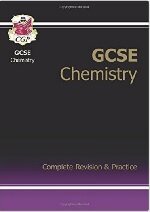 For anyone with even a remote interest in passing their GCSEs, the CGP guides are almost required reading. These well-known guides, suitable for all exam boards, cover most major GCSE subjects and are regularly updated in order to remain relevant. They are perhaps the United Kingdom’s most trusted resource for those looking to achieve the best GCSE results.
For anyone with even a remote interest in passing their GCSEs, the CGP guides are almost required reading. These well-known guides, suitable for all exam boards, cover most major GCSE subjects and are regularly updated in order to remain relevant. They are perhaps the United Kingdom’s most trusted resource for those looking to achieve the best GCSE results.
The GCSE Chemistry Complete Revision Guide is a particularly good example for what makes CGP such a popular choice for GCSE prep. This guide uses colourful diagrams, an attractive format, and clear language to present the subject matter in a way that is accessible to all. All the relevant topics are covered in sufficient detail, interspersed with practice exam questions to allow students to test themselves as they go through. Otherwise dense and tricky material is broken down into digestible chunks, without omitting the important parts.
What’s more, all the information is presented in a witty, humorous tone, which relieves much of the stress and boredom often associated with revision and helps keep the learning process fun. An excellent source of GCSE revision tips and a valuable tool that almost any student can benefit from, this title – and, indeed, the entire CGP series – easily rank among the best GCSE books out there and is well worth its very reasonable price tag.
New GCSE English Language AQA Complete Revision & Practice
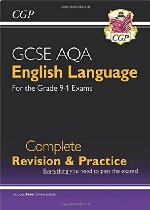 Another CGP title, the GCSE English Language AQA Complete Revision Guide – Grade 9-1 Course comes with all the above CGP benefits such as colourful diagrams, a clear layout, and engaging delivery. This book focuses on the English Language exam, and closely matches the requirements of the AQA exam board.
Another CGP title, the GCSE English Language AQA Complete Revision Guide – Grade 9-1 Course comes with all the above CGP benefits such as colourful diagrams, a clear layout, and engaging delivery. This book focuses on the English Language exam, and closely matches the requirements of the AQA exam board.
A particularly interesting feature is the use of topics to think and write about, in place of conventional practice questions, which encourage students to think more critically and addresses more general skills. Online resources complement the physical guides.
The book covers how to approach each different question type, and contain tips on how to write for different purposes, which can be applied to other topics and areas of life. The guide’s usefulness is not limited to the revision season, and can be used throughout the GCSE course to aid learning. We should perhaps note that the content is a little broad, and covers a wide range of ability levels. Serious students may want to supplement the materials with more level-specific guides, but generally speaking this is an excellent and comprehensive revision tool.
My Revision Notes
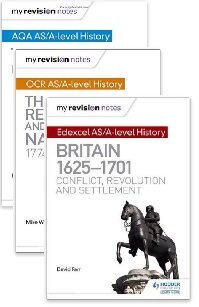 Delivering a more specific approach, books in Hodder Education’s My Revision Notes series focus mainly on science-based topics such as Chemistry, Biology, Physics, and Geography. The material stays highly on-topic throughout, teaching only information that will be useful in the exam instead of filling out the pages with irrelevant facts and details.
Delivering a more specific approach, books in Hodder Education’s My Revision Notes series focus mainly on science-based topics such as Chemistry, Biology, Physics, and Geography. The material stays highly on-topic throughout, teaching only information that will be useful in the exam instead of filling out the pages with irrelevant facts and details.
The pages are adorned with colourful diagrams and clearly laid out, allowing students to progress through the chapters easily and comfortably. The guides are geared towards helping readers stay more organised with their revision, and as a result come with an in-built study planner. Readers also have the option to personalise the material and supplement it with their own notes and annotations.
What’s more, the My Revision Notes guides are tailored to specific exam board such as AQA and Edexcel. This ensures that the contents are as close to the student’s needs as possible, creating a more focused and reliable source of information. Laden with practice questions, case studies, and model answers, the books give students a solid understanding of how to succeed, and online assistance means help isn’t restricted to the pages. The guides are even available on Amazon Kindle, so they can be accessed from anywhere.
York Notes
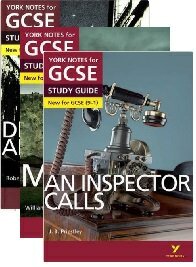 Coming to the aid of everyone studying for a GCSE in English, the York Notes guides offer a detailed and informative breakdown of numerous different GCSE texts. The books cover many different aspects of each text, including key themes, character profiles, and lists of useful quotes with explanations. A clear understanding of all these areas is necessary to perform well in the exam, and the guides are excellent at preparing students in this way. They also contain tips on essay writing, along with model answers and guidance with textual analysis. The attractive illustrations and bright, clear format make the books a pleasure to read, and chapter summaries make the reading process as easy as possible for all students.
Coming to the aid of everyone studying for a GCSE in English, the York Notes guides offer a detailed and informative breakdown of numerous different GCSE texts. The books cover many different aspects of each text, including key themes, character profiles, and lists of useful quotes with explanations. A clear understanding of all these areas is necessary to perform well in the exam, and the guides are excellent at preparing students in this way. They also contain tips on essay writing, along with model answers and guidance with textual analysis. The attractive illustrations and bright, clear format make the books a pleasure to read, and chapter summaries make the reading process as easy as possible for all students.
The activities for studying, along with descriptions of what needs to be done to attain a particular grade, provide yet more valuable assistance for students and give honest and direct advice. Students at all ability levels will appreciate the simplicity and straightforward style of the York Notes guides. These titles are comprehensive and friendly guides that have a great deal to offer any student – they take much of the pain out of the revision process.
OCR GCSE Modern World History Revision Guide 2nd Edition
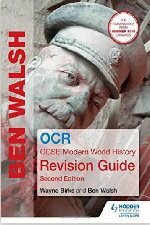 Written by Ben Walsh, an experienced teacher of history and GCSE examiner, the Modern World History Revision Guide is a great tool for anyone preparing for their GCSE history exam.
Written by Ben Walsh, an experienced teacher of history and GCSE examiner, the Modern World History Revision Guide is a great tool for anyone preparing for their GCSE history exam.
The books are a rich source of key information, exam guidance, and revision tasks targeting all key areas of the exam. In addition to this, the guides encourage students to adopt their own view on topics, to fulfil the all-important critical analysis criteria necessary to hit the highest GCSE grades. The Modern World History Revision Guides strike a balance between too much and too little information, outstripping many other GCSE study guides in terms of detail while retaining the simplicity and clarity that a good revision book needs.
Different editions of the book exist, focusing on different exam boards, which is important when the subject matter and exam structure varies depending on who produced the test. Occasionally, the guides can omit some information, which however may well be by design and adds to the focused style. Generally though, these textbooks match the syllabus closely, use strong source materials, and are a valuable asset to GCSE history students of all ability levels.
Raise Your Grade: The Ultimate Revision Guide for GCSE and A-Level
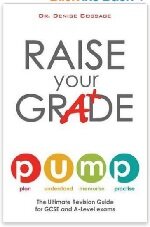 With an innovative and unique approach to GCSE revision, Dr. Denise Gossage’s Raise Your Grade gives students an engaging and useful guide to passing exams with relative ease. This guide uses its own ‘PUMP’ formula, which translates to ‘plan, understand, memorise, and practice’. This method walks students through the process, breaking down an otherwise difficult task into something manageable and engaging. In writing the books, the author consulted 25 of the UK’s most successful students who had been accepted into Oxford University. She also made use of scientific research on the best ways to revise, along with information from GCSE examiners.
With an innovative and unique approach to GCSE revision, Dr. Denise Gossage’s Raise Your Grade gives students an engaging and useful guide to passing exams with relative ease. This guide uses its own ‘PUMP’ formula, which translates to ‘plan, understand, memorise, and practice’. This method walks students through the process, breaking down an otherwise difficult task into something manageable and engaging. In writing the books, the author consulted 25 of the UK’s most successful students who had been accepted into Oxford University. She also made use of scientific research on the best ways to revise, along with information from GCSE examiners.
The book is simple and accessible, packed with useful tips and suggestions on how to do well in the exams, and delivered in the author’s personable and friendly voice. It doesn’t read like the dronings of a boring lecturer; drawing instead on quotes from previous students and the author’s own stories to provide inspiration and entertainment. The book is simple, enjoyable, and helps students feel confident and sure in their ability to do well by walking them through the process in a pleasant and supportive way.
I Hate Revision: Study Skills and Revision Techniques for GCSE
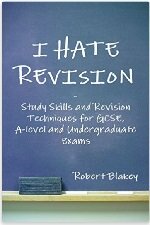 It’s all too rare that even the best GCSE books make use of a scientific perspective, but the I Hate Revision guide is one of them. Aimed at students who ‘can’t be bothered’ with revision, this guide draws on a vast reservoir of scientific studies and research, bombarding the reader with psychological evidence on the best (and worst) ways to revise. The book is written by an actual student, which, along with the heaps of psychological backing, lends a degree of credibility to the guides and reassures students of the effectiveness of the techniques within. It contains strategies for effective revision and tips on how to pass exams, all of which is delivered in simple, easy to understand language aimed at students.
It’s all too rare that even the best GCSE books make use of a scientific perspective, but the I Hate Revision guide is one of them. Aimed at students who ‘can’t be bothered’ with revision, this guide draws on a vast reservoir of scientific studies and research, bombarding the reader with psychological evidence on the best (and worst) ways to revise. The book is written by an actual student, which, along with the heaps of psychological backing, lends a degree of credibility to the guides and reassures students of the effectiveness of the techniques within. It contains strategies for effective revision and tips on how to pass exams, all of which is delivered in simple, easy to understand language aimed at students.
The guide may be overly dense for some students, with its heavy focus on scientific data and psychological research, and could possibly make use of more colourful designs and a more user-friendly format. Nevertheless, the guide is full of useful advice, confidently backed with solid empirical evidence, giving students a reliable and useful weapon in their fight against GCSE exams.
Mr Bruff Guide to the 2017/18 GCSE English Language Exams
 The brainchild of an experienced English teacher and YouTuber, Mr Bruff’s Guide to the GCSE English Language Exam is an excellent assistant to any student taking on their English examinations. Highly critically acclaimed, the guide covers the techniques required to do well. Focus is on the technical aspect of the exams and mark schemes, and the points that students should focus on in order to score as highly as possible. The exam objectives are explained clearly, with sample answers on hand to help students understand what is expected.
The brainchild of an experienced English teacher and YouTuber, Mr Bruff’s Guide to the GCSE English Language Exam is an excellent assistant to any student taking on their English examinations. Highly critically acclaimed, the guide covers the techniques required to do well. Focus is on the technical aspect of the exams and mark schemes, and the points that students should focus on in order to score as highly as possible. The exam objectives are explained clearly, with sample answers on hand to help students understand what is expected.
All information is presented in a concise and detailed way. Furthermore, the book grants access to online video tutorials by the author, which provide extra information presented in a medium which may be more accessible to some than reading. The step-by-step approach increases the simplicity of the guide, helping students through the learning process. Overall, we found this to be a superb resource and highly recommend it as one the best GCSE books.
How to Achieve 100 Per Cent in a GCSE
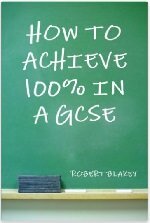 This is the first title by Robert Blakey (who’s also the author of I Hate Revision, reviewed above), written when he was a 16-year-old student who achieved 10 A* grades in his GCSEs, How to Achieve 100% in a GCSE (Exam and Revision Technique Guide) is an inspirational and useful guide for students. This GCSE book contains plenty of tips and strategies on how to revise effectively and do well in exams. Easy to read and engaging, the book also carries a certain credibility due to the fact that it was written by an exceptionally successful GCSE student who used the tips within to secure his impressive grades. As a result, the guide is not only a collection of tips, but an empowering story, helping students realise that they, too, can achieve great GCSEs.
This is the first title by Robert Blakey (who’s also the author of I Hate Revision, reviewed above), written when he was a 16-year-old student who achieved 10 A* grades in his GCSEs, How to Achieve 100% in a GCSE (Exam and Revision Technique Guide) is an inspirational and useful guide for students. This GCSE book contains plenty of tips and strategies on how to revise effectively and do well in exams. Easy to read and engaging, the book also carries a certain credibility due to the fact that it was written by an exceptionally successful GCSE student who used the tips within to secure his impressive grades. As a result, the guide is not only a collection of tips, but an empowering story, helping students realise that they, too, can achieve great GCSEs.
This study guide is also accessible and enjoyable, and clearly written by a young student instead of an out of touch and ‘boring’ adult. Admittedly, much of the information in the book is not new, and can be found online or with the help of a teacher. The techniques are built around basic principles of revision and exam strategy, and are often intuitive. The real strength of this book lies in the story behind it, the credentials of the author, and his friendly, understandable tone. How to Achieve 100% takes readily available information and condenses it into a clear guide, delivered in a language that GCSE students will understand.
How to ACE Your GCSEs
 Straightforward, direct, and trustworthy, How to Ace your GCSEs (subtitle: Inspired by Student Success Stories. We Tell You What Your Teachers Don’t) by Academic Underdogs relies on some simple yet fundamental principles of revision to create one of the best GCSE books on the market. The book draws on the tested methods of top students, and delivers solid advice on how to work hard and effectively. It also comes with invaluable tricks to help maximise motivation and maintain focus during long, tiresome study sessions.
Straightforward, direct, and trustworthy, How to Ace your GCSEs (subtitle: Inspired by Student Success Stories. We Tell You What Your Teachers Don’t) by Academic Underdogs relies on some simple yet fundamental principles of revision to create one of the best GCSE books on the market. The book draws on the tested methods of top students, and delivers solid advice on how to work hard and effectively. It also comes with invaluable tricks to help maximise motivation and maintain focus during long, tiresome study sessions.
This book doesn’t teach exam content like some other GCSE revision guides; the focus is on general strategy and how to approach the preparation for exams in any subject. The interesting, original knowledge is delivered in a concise and clear way, avoiding any unnecessary information.
Although much of the book consists of the author’s personal stories and anecdotes, How to Ace your GCSEs remains a fresh and effective source of help for GCSE students. Although it is a strong and highly recommended all round guide, perhaps those who will benefit the most are first-timers with little prior experience of revision guides and techniques, while veteran exam-takers may benefit from combining this resource with additional or more advanced guides.
Best GCSE Books - Top 3
| Ranking | Publisher | Book Title | Pages | Year | Practice Tests | Price Range |
|---|---|---|---|---|---|---|
| 1 | CGP | GCSE Chemistry | 272 | 2012 | N/A | ££ |
| 2 | CGP | New GCSE English Language AQA Complete Revision & Practice | 140 | 2016 | N/A | £ |
| 3 | Hodder Education | My Revision Notes Series | N/A | 2011-2017 | N/A | £-££ |
